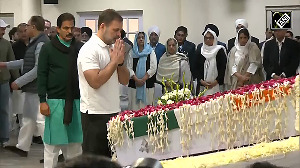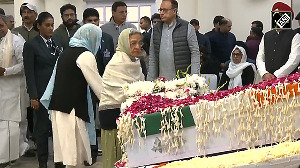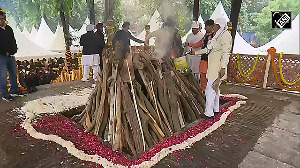 You don't see poverty in the urban belt of eastern China.
You don't see poverty in the urban belt of eastern China.
There is an occasional beggar, blind or otherwise handicapped, who may extend his hand for alms. One or two impoverished men may also be spotted looking into garbage bins for half-eaten food items.
But you don't see slums and ill-clad children and starving women. Extreme poverty and overwhelming filth of the kind that hit you again and again in Indian cities seem to have been abolished in urban China.
This is a big leap forward from the massive poverty of the imperialist era and the famine days of Mao Zedong's experiments with permanent revolution.
Not surprisingly, anyone who can speak English would rather talk about Deng Hsiaoping than Mao Zedong. Anna, for example. She was born in post-Mao China and is today a manager in a serviced apartments company. When I asked about living conditions in China, she asked me whether I had heard of Deng. I said yes but what about Mao's days?
All of Beijing is an Olympic venue
Her response sounded typical of modern Chinese youth. She said: "My parents and grandparents had a hard time during Mao's days. But he was a great leader. He made China free. Deng Hsiaoping made China happy."
I said thousands in the big cities must be unhappy because their houses had been demolished to make way for modern buildings. Anna's family was one of those who were affected. But they were not complaining, she said. "My family was poor farmers. Their land was taken away to help developers build highrise residential blocks. But they were given good prices and new houses. Most people who were displaced got a good deal. Some complained but they had to agree when all others agreed."
An electrician who works for Anna's company lost his job when his factory was demolished to make way for a park. He was without a job for a few months until he got his present job which gets him a little over 3000 yuan a month (20,000 rupees). That's about the earnings of a taxi driver and of other ordinary workers. For college graduates at the entry level, the starting salary is also about 3000 yuan though skilled graduates from some outstanding universities may start at double that salary. You need about 5000 yuan to live quite comfortably in the cities, so a supplementary income is welcome in most ordinary families.
It's a very different story at the top. Leading financial companies have been doubling and trebling the salaries of their boss officers. Many big executives in the big private companies earn more than 25 million yuan a year after taxes (more than 15 crore rupees). That explains why shining Rolls Royce cars are on display in automobile showrooms. Flats in Shanghai's highrise residences were selling recently at 15,000 yuan per square metre (about Rs 1 lakh). Luxury villas sold at 25,000 yuan per square metre. The world's most expensive jewellery names like Cartiers do good business in China.
This must be what Deng Hsiaoping meant when he talked about socialism with a Chinese face.
China diary: Paris of the Orient
The booming economy means also a galloping population of expatriates. But unlike in India, there is a marked differentiation between locals and foreigners in China. The visible example of this is in housing: there are some buildings and some areas that are exclusively for foreigners.
A less visible but more interesting example of the divide between locals and foreigners catches our attention if we go in search of medical assistance. Urban China is notorious for bronchial illnesses like cold and flu and breathing difficulties. If you are a foreigner and develop a sore throat, you better know where to go and what to do.
A local friend took me to a big hospital in Shanghai. At the gate, the watchman told us that the locals' wing was on the right and the foreigners' wing on the left. We decided to go to the locals' wing.
The verandahs were full of patients lying on stretchers and cots with tubes and bottles attached to them. But the service turned out to be prompt. The local friend got me registered (10 yuan), a young doctor examined me (no charge, waiting time only five minutes), a routine blood test was done (50 yuan, completed in 20 minutes on the spot) and a prescription made out for vitamins and Paracetamol (50 yuan). Very efficient and economical procedures, I thought.
Very different was the story when my host had the same sore throat complaint attended to. He works for a foreign company which has an insurance tie-up with what are known as expatriate hospitals in China. He went to one of these hospitals. He too got himself registered, a Chinese doctor examined him, called for a routine blood test and chest x-ray, then prescribed the same vitamins and Paracetamol. He then got a neatly printed bill. The blood test and x-ray cost 990 yuan and there was an additional doctor's charge of 1000 yuan. Plus the cost of the medicines. That is, 2000 yuan (15,000 rupees) against my 72 yuan (about 500 rupees).
He could have gone to the same locals' wing of the hospital that treated me. But his company has this insurance arrangement, so what does he do? Who is taking whom for a ride? Whether it is food or medical services, you are better off in China if you have a local friend to guide you.
Image: The Olympic Forest Park South Gate station at Beijing's Olympic Branch Line. The city opened two new subway lines and air airport link for the Beijing Olympics. Photo: China Photos/Getty Images
Now a Bangalore resident, TJS George lived as a journalist in Hongkong through the 1960s and 1970s






 © 2024 Rediff.com -
© 2024 Rediff.com -